

Choose Your Test
- Search Blogs By Category
- College Admissions
- AP and IB Exams
- GPA and Coursework
Expert's Guide to the AP Literature Exam
Advanced Placement (AP)

If you're planning to take the AP English Literature and Composition exam, you'll need to get familiar with what to expect on the test. Whether the 2023 test date of Wednesday, May 3, is near or far, I'm here to help you get serious about preparing for the exam.
In this guide, I'll go over the test's format and question types, how it's graded, best practices for preparation, and test-day tips. You'll be on your way to AP English Lit success in no time!

AP English Literature: Exam Format and Question Types
The AP Literature Exam is a three-hour exam that contains two sections in this order:
- An hour-long, 55-question multiple-choice section
- A two-hour, three-question free-response section
The exam tests your ability to analyze works and excerpts of literature and cogently communicate that analysis in essay form.
Read on for a breakdown of the two different sections and their question types.
Section I: Multiple Choice
The multiple-choice section, or Section I of the AP Literature exam, is 60 minutes long and has 55 questions. It counts for 45% of your overall exam grade .
You can expect to see five excerpts of prose and poetry. You will always get at least two prose passages (fiction or drama) and two poetry passages. In general, you will not be given the author, date, or title for these works, though occasionally the title of a poem will be given. Unusual words are also sometimes defined for you.
The date ranges of these works could fall from the 16th to the 21st century. Most works will be originally written in English, but you might occasionally see a passage in translation.
There are, generally speaking, eight kinds of questions you can expect to see on the AP English Literature and Composition exam. I'll break each of them down here and give you tips on how to identify and approach them.

"Pretty flowers carried by ladies" is not one of the question types.
The 8 Multiple-Choice Question Types on the AP Literature Exam
Without further delay, here are the eight question types you can expect to see on the AP Lit exam. All questions are taken from the sample questions on the AP Course and Exam Description .
#1: Reading Comprehension
These questions test your ability to understand what the passage is saying on a pretty basic level . They don't require you to do a lot of interpretation—you just need to know what's going on.
You can identify this question type from words and phrases such as "according to," "mentioned," "asserting," and so on. You'll succeed on these questions as long as you carefully read the text . Note that you might have to go back and reread parts to make sure you understand what the passage is saying.

#2: Inference
These questions ask you to infer something—a character or narrator's opinion, an author's intention, etc.—based on what is said in the passage . It will be something that isn't stated directly or concretely but that you can assume based on what's clearly written in the passage. You can identify these questions from words such as "infer" and "imply."
The key to these questions is to not get tripped up by the fact that you are making an inference—there will be a best answer, and it will be the choice that is best supported by what is actually found in the passage .
In many ways, inference questions are like second-level reading comprehension questions: you need to know not just what a passage says, but also what it means.

#3: Identifying and Interpreting Figurative Language
These are questions for which you have to either identify what word or phrase is figurative language or provide the meaning of a figurative phrase . You can identify these as they will either explicitly mention figurative language (or a figurative device, such as a simile or metaphor ) or include a figurative phrase in the question itself.
The meaning of figurative phrases can normally be determined by that phrase's context in the passage—what is said around it? What is the phrase referring to?
Example 1: Identifying
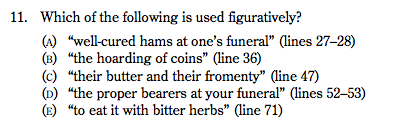
Example 2: Interpreting

#4: Literary Technique
These questions involve identifying why an author does what they do , from using a particular phrase to repeating certain words. Basically, what techniques is the author using to construct the passage/poem, and to what effect?
You can identify these questions by words/phrases such as "serves chiefly to," "effect," "evoke," and "in order to." A good way to approach these questions is to ask yourself: so what? Why did the author use these particular words or this particular structure?

#5: Character Analysis
These questions ask you to describe something about a character . You can spot them because they will refer directly to characters' attitudes, opinions, beliefs, or relationships with other characters .
This is, in many ways, a special kind of inference question , since you are inferring the broader personality of the character based on the evidence in a passage. Also, these crop up much more commonly for prose passages than they do for poetry ones.

#6: Overall Passage Questions
Some questions ask you to identify or describe something about the passage or poem as a whole : its purpose, tone, genre, etc. You can identify these by phrases such as "in the passage" and "as a whole."
To answer these questions, you need to think about the excerpt with a bird's-eye view . What is the overall picture created by all the tiny details?

#7: Structure
Some AP Lit questions will ask you about specific structural elements of the passage: a shift in tone, a digression, the specific form of a poem, etc . Often these questions will specify a part of the passage/poem and ask you to identify what that part is accomplishing.
Being able to identify and understand the significance of any shifts —structural, tonal, in genre, and so on—will be of key importance for these questions.

#8: Grammar/Nuts & Bolts
Very occasionally you will be asked a specific grammar question , such as what word an adjective is modifying. I'd also include in this category super-specific questions such as those that ask about the meter of a poem (e.g., iambic pentameter).
These questions are less about literary artistry and more about the fairly dry technique involved in having a fluent command of the English language .
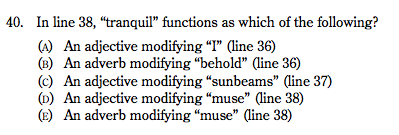
That covers the eight question types on the multiple-choice section. Now, let's take a look at the free-response section of the AP Literature exam.
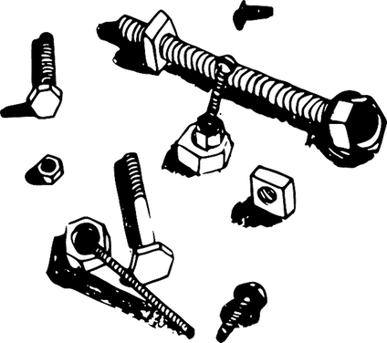
Keep track of the nuts and bolts of grammar.
Section II: Free Response
The AP Literature Free Response section is two hours long and involves three free-response essay questions , so you'll have about 40 minutes per essay. That's not a lot of time considering this section of the test counts for 55% of your overall exam grade !
Note, though, that no one will prompt you to move from essay to essay, so you can theoretically divide up the time however you want. Just be sure to leave enough time for each essay! Skipping an essay, or running out of time so you have to rush through one, can really impact your final test score.
The first two essays are literary analysis essays of specific passages, with one poem and one prose excerpt. The final essay is an analysis of a given theme in a work selected by you , the student.
Essays 1 & 2: Literary Passage Analysis
For the first two essays, you'll be presented with an excerpt and directed to analyze the excerpt for a given theme, device, or development . One of the passages will be poetry, and one will be prose. You will be provided with the author of the work, the approximate date, and some orienting information (i.e., the plot context of an excerpt from a novel).
Below are some sample questions from the 2022 Free Response Questions .

Essay 3: Thematic Analysis
For the third and final essay, you'll be asked to discuss a particular theme in a work that you select . You will be provided with a list of notable works that address the given theme below the prompt, but you can also choose to discuss any "work of literary merit."
So while you do have the power to choose which work you wish to write an essay about , the key words here are "literary merit." That means no genre fiction! Stick to safe bets like authors in the list on pages 10-11 of the old 2014 AP Lit Course Description .
(I know, I know—lots of genre fiction works do have literary merit and Shakespeare actually began as low culture, and so on and so forth. Indeed, you might find academic designations of "literary merit" elitist and problematic, but the time to rage against the literary establishment is not your AP Lit test! Save it for a really, really good college admissions essay instead .)
Here's a sample question from 2022:
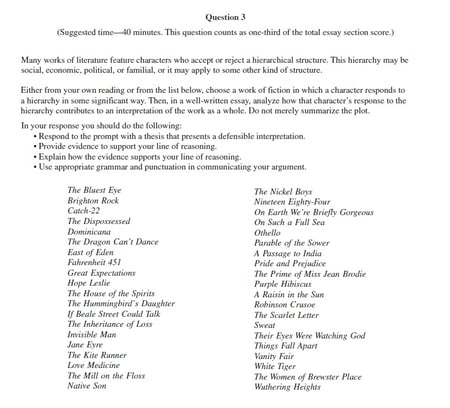
As you can see, the list of works provided spans many time periods and countries : there are ancient Greek plays ( Antigone ), modern literary works (such as Margaret Atwood's The Handmaid's Tale ), Shakespeare plays ( The Tempest ), 19th-century English plays ( The Importance of Being Earnest ), etc. So you have a lot to work with!
Also note that you can choose a work of "comparable literary merit." That means you can select a work not on this list as long as it's as difficult and meaningful as the example titles you've been given. So for example, Jane Eyre or East of Eden would be great choices, but Twilight or The Hunger Games would not.
Our advice? If you're not sure what a work of "comparable literary merit" is, stick to the titles on the provided list .
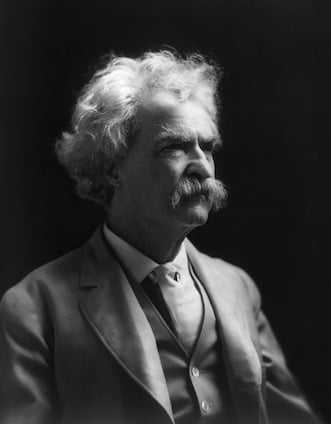
You might even see something by this guy.
How Is the AP Literature Test Graded?
The multiple-choice section of the exam comprises 45% of your total exam score; the three essays, or free-response section, comprise the other 55%. Each essay, then, is worth about 18% of your grade.
As on other AP exams, your raw score will be converted to a score from 1-5 . You don't have to get every point possible to get a 5 by any means. In 2022, 16.9% of students received 5s on the AP English Literature test, the 14th highest 5 score out of the 38 different AP exams.
So, how do you calculate your raw scores?
Multiple-Choice Scoring
For the multiple-choice section, you receive 1 point for each question you answer correctly . There's no guessing penalty, so you should answer every question—but guess only after you're able to eliminate any answer you know is wrong to up your chances of choosing the right one.
Free-Response Scoring
Scoring for multiple choice is pretty straightforward; however, essay scoring is a little more complicated.
Each of your essays will receive a score from 0 to 6 based on the College Board rubric , which also includes question-specific rubrics. All the rubrics are very similar, with only minor differences between them.
Each essay rubric has three elements you'll be graded on:
- Thesis (0-1 points)
- Evidence and Commentary (0-4 points)
- Sophistication (0-1 points)
We'll be looking at the current rubric for the AP Lit exam , which was released in September 2019, and what every score means for each of the three elements above:
| Restates prompt. Makes generalized comment. Describes work rather than making a claim. | Is incoherent or does not address prompt. May be just opinion with no textual references or references that are irrelevant. | Attempts to contextualize interpretation consist mainly of sweeping generalizations. Only hints at other interpretations. Does not consistently maintain thematic interpretation. Oversimplifies complexities. Uses overly complex language. | |
| Provides defensible interpretation in response to prompt. | Focuses on broad elements, summary, or description rather than specific details or techniques. Mentions literary elements, devices, or techniques with little or no explanation. | Identifies and explores complexities/tensions within work. Situates interpretation within broader context. Accounts for alternative interpretations. Style is consistently vivid and persuasive. | |
| — | Consists of mix of specific evidence and broad generalities. May contain some simplistic, inaccurate, or repetitive explanations. Does not make multiple supporting claims or does not support more than one claim. No clear connections or progression between claims. | — | |
| — | Uniformly offers evidence to support claims. Focuses on importance of specific words and details. Organizes argument as line of reasoning composed of several supporting claims. Commentary may fail to integrate some evidence or support key claim. | — | |
| — | Uniformly offers evidence to support claims. Focuses on importance of specific words and details. Organizes argument as line of reasoning composed of several supporting claims, each with adequate evidence. Explains how use of literary techniques contributes to interpretation. | — |
To get a high-scoring essay in the 5-6 point range, you'll need to not only come up with an original and intriguing argument that you thoroughly support with textual evidence, but you’ll also need to stay focused, organized, and clear. And all in just 40 minutes per essay!
If getting a high score on this section sounds like a tall order, that's because it is.

Practice makes perfect!
Skill-Building for Success on the AP Literature Exam
There are several things you can do to hone your skills and best prepare for the AP Lit exam.
Read Some Books, Maybe More Than Once
One of the most important steps you can take to prepare for the AP Literature and Composition exam is to read a lot and read well . You'll be reading a wide variety of notable literary works in your AP English Literature course, but additional reading will help you further develop your analytical reading skills .
I suggest checking out this list of notable authors in the 2014 AP Lit Course Description (pages 10-11).
In addition to reading broadly, you'll want to become especially familiar with the details of four to five books with different themes so you'll be prepared to write a strong student-choice essay. You should know the plot, themes, characters, and structural details of these books inside and out.
See my AP English Literature Reading List for more guidance.
Read (and Interpret) Poetry
One thing students might not do very much on their own time but that will help a lot with AP Lit exam prep is to read poetry. Try to read poems from a lot of eras and authors to get familiar with the language.
We know that poetry can be intimidating. That's why we've put together a bunch of guides to help you crack the poetry code (so to speak). You can learn more about poetic devices —like imagery and i ambic pentameter —in our comprehensive guide. Then you can see those analytical skills in action in our expert analysis of " Do not go gentle into that good night " by Dylan Thomas.
When you think you have a grip on basic comprehension, you can then move on to close reading (see below).
Hone Your Close Reading and Analysis Skills
Your AP class will likely focus heavily on close reading and analysis of prose and poetry, but extra practice won't hurt you. Close reading is the ability to identify which techniques the author is using and why. You'll need to be able to do this both to gather evidence for original arguments on the free-response questions and to answer analytical multiple-choice questions.
Here are some helpful close reading resources for prose :
- University of Wisconsin-Madison Writing Center's guide to close reading
- Harvard College Writing Center's close reading guide
- Purdue OWL's article on steering clear of close reading "pitfalls"
And here are some for poetry :
- University of Wisconsin-Madison's poetry-reading guide
- This guide to reading poetry at Poets.org (complete with two poetry close readings)
- Our own expert analyses of famous poems, such as " Ozymandias ", and the 10 famous sonnets you should know
Learn Literary and Poetic Devices
You'll want to be familiar with literary terms so that any test questions that ask about them will make sense to you. Again, you'll probably learn most of these in class, but it doesn't hurt to brush up on them.
Here are some comprehensive lists of literary terms with definitions :
- The 31 Literary Devices You Must Know
- The 20 Poetic Devices You Must Know
- The 9 Literary Elements You'll Find In Every Story
- What Is Imagery?
- Understanding Assonance
- What Is Iambic Pentameter in Poetry?
- Simile vs Metaphor: The 1 Big Difference
- 10 Personification Examples in Poetry, Literature, and More
Practice Writing Essays
The majority of your grade on the AP English Lit exam comes from essays, so it's critical that you practice your timed essay-writing skills . You of course should use the College Board's released free-response questions to practice writing complete timed essays of each type, but you can also practice quickly outlining thorough essays that are well supported with textual evidence.
Take Practice Tests
Taking practice tests is a great way to prepare for the exam. It will help you get familiar with the exam format and overall experience . You can get sample questions from the Course and Exam Description , the College Board website , and our guide to AP English Lit practice test resources .
Be aware that the released exams don't have complete slates of free-response questions, so you might need to supplement these with released free-response questions .
Since there are three complete released exams, you can take one toward the beginning of your prep time to get familiar with the exam and set a benchmark, and one toward the end to make sure the experience is fresh in your mind and to check your progress.

Don't wander like a lonely cloud through your AP Lit prep.
AP Literature: 6 Critical Test-Day Tips
Before we wrap up, here are my six top tips for AP Lit test day:
- #1: On the multiple-choice section, it's to your advantage to answer every question. If you eliminate all the answers you know are wrong before guessing, you'll raise your chances of guessing the correct one.
- #2: Don't rely on your memory of the passage when answering multiple-choice questions (or when writing essays, for that matter). Look back at the passage!
- #3: Interact with the text : circle, mark, underline, make notes—whatever floats your boat. This will help you retain information and actively engage with the passage.
- #4: This was mentioned above, but it's critical that you know four to five books well for the student-choice essay . You'll want to know all the characters, the plot, the themes, and any major devices or motifs the author uses throughout.
- #5: Be sure to plan out your essays! Organization and focus are critical for high-scoring AP Literature essays. An outline will take you a few minutes, but it will help your writing process go much faster.
- #6: Manage your time on essays closely. One strategy is to start with the essay you think will be the easiest to write. This way you'll be able to get through it while thinking about the other two essays.

And don't forget to eat breakfast! Apron optional.
AP Literature Exam: Key Takeaways
The AP Literature exam is a three-hour test that includes an hour-long multiple-choice section based on five prose and poetry passages and with 55 questions, and a two-hour free-response section with three essays : one analyzing a poetry passage, one analyzing a prose passage, and one analyzing a work chosen by you, the student.
The multiple-choice section is worth 45% of your total score , and the free-response section is worth 55% . The three essays are each scored on a rubric of 0-6, and raw scores are converted to a final scaled score from 1 to 5.
Here are some things you can do to prepare for the exam:
- Read books and be particularly familiar with four to five works for the student-choice essays
- Read poetry
- Work on your close reading and analysis skills
- Learn common literary devices
- Practice writing essays
- Take practice tests!
On test day, be sure to really look closely at all the passages and really interact with them by marking the text in a way that makes sense to you. This will help on both multiple-choice questions and the free-response essays. You should also outline your essays before you write them.
With all this in mind, you're well on your way to AP Lit success!
What's Next?
If you're taking other AP exams this year, you might be interested in our other AP resources: from the Ultimate Guide to the US History Exam , to the Ultimate AP Chemistry Study Guide , to the Best AP Psychology Study Guide , we have tons of articles on AP courses and exams for you !
Looking for practice exams? Here are some tips on how to find the best AP practice tests . We've also got comprehensive lists of practice tests for AP Psychology , AP Biology , AP Chemistry , and AP US History .
Deciding which APs to take? Take a look through the complete list of AP courses and tests , read our analysis of which AP classes are the hardest and easiest , and learn how many AP classes you should take .

Trending Now
How to Get Into Harvard and the Ivy League
How to Get a Perfect 4.0 GPA
How to Write an Amazing College Essay
What Exactly Are Colleges Looking For?
ACT vs. SAT: Which Test Should You Take?
When should you take the SAT or ACT?
Get Your Free

Find Your Target SAT Score
Free Complete Official SAT Practice Tests
How to Get a Perfect SAT Score, by an Expert Full Scorer
Score 800 on SAT Math
Score 800 on SAT Reading and Writing
How to Improve Your Low SAT Score
Score 600 on SAT Math
Score 600 on SAT Reading and Writing
Find Your Target ACT Score
Complete Official Free ACT Practice Tests
How to Get a Perfect ACT Score, by a 36 Full Scorer
Get a 36 on ACT English
Get a 36 on ACT Math
Get a 36 on ACT Reading
Get a 36 on ACT Science
How to Improve Your Low ACT Score
Get a 24 on ACT English
Get a 24 on ACT Math
Get a 24 on ACT Reading
Get a 24 on ACT Science
Stay Informed
Get the latest articles and test prep tips!

Ellen has extensive education mentorship experience and is deeply committed to helping students succeed in all areas of life. She received a BA from Harvard in Folklore and Mythology and is currently pursuing graduate studies at Columbia University.
Ask a Question Below
Have any questions about this article or other topics? Ask below and we'll reply!
*** Enter the $2,000 College Transitions No Essay Scholarship Contest ***
How to Write the AP Lit Prose Essay with Examples
March 30, 2024
AP Lit Prose Essay Examples – The College Board’s Advanced Placement Literature and Composition Course is one of the most enriching experiences that high school students can have. It exposes you to literature that most people don’t encounter until college , and it helps you develop analytical and critical thinking skills that will enhance the quality of your life, both inside and outside of school. The AP Lit Exam reflects the rigor of the course. The exam uses consistent question types, weighting, and scoring parameters each year . This means that, as you prepare for the exam, you can look at previous questions, responses, score criteria, and scorer commentary to help you practice until your essays are perfect.
What is the AP Lit Free Response testing?
In AP Literature, you read books, short stories, and poetry, and you learn how to commit the complex act of literary analysis . But what does that mean? Well, “to analyze” literally means breaking a larger idea into smaller and smaller pieces until the pieces are small enough that they can help us to understand the larger idea. When we’re performing literary analysis, we’re breaking down a piece of literature into smaller and smaller pieces until we can use those pieces to better understand the piece of literature itself.
So, for example, let’s say you’re presented with a passage from a short story to analyze. The AP Lit Exam will ask you to write an essay with an essay with a clear, defensible thesis statement that makes an argument about the story, based on some literary elements in the short story. After reading the passage, you might talk about how foreshadowing, allusion, and dialogue work together to demonstrate something essential in the text. Then, you’ll use examples of each of those three literary elements (that you pull directly from the passage) to build your argument. You’ll finish the essay with a conclusion that uses clear reasoning to tell your reader why your argument makes sense.
AP Lit Prose Essay Examples (Continued)
But what’s the point of all of this? Why do they ask you to write these essays?
Well, the essay is, once again, testing your ability to conduct literary analysis. However, the thing that you’re also doing behind that literary analysis is a complex process of both inductive and deductive reasoning. Inductive reasoning takes a series of points of evidence and draws a larger conclusion. Deductive reasoning departs from the point of a broader premise and draws a singular conclusion. In an analytical essay like this one, you’re using small pieces of evidence to draw a larger conclusion (your thesis statement) and then you’re taking your thesis statement as a larger premise from which you derive your ultimate conclusion.
So, the exam scorers are looking at your ability to craft a strong thesis statement (a singular sentence that makes an argument), use evidence and reasoning to support that argument, and then to write the essay well. This is something they call “sophistication,” but they’re looking for well-organized thoughts carried through clear, complete sentences.
This entire process is something you can and will use throughout your life. Law, engineering, medicine—whatever pursuit, you name it—utilizes these forms of reasoning to run experiments, build cases, and persuade audiences. The process of this kind of clear, analytical thinking can be honed, developed, and made easier through repetition.
Practice Makes Perfect
Because the AP Literature Exam maintains continuity across the years, you can pull old exam copies, read the passages, and write responses. A good AP Lit teacher is going to have you do this time and time again in class until you have the formula down. But, it’s also something you can do on your own, if you’re interested in further developing your skills.
AP Lit Prose Essay Examples
Let’s take a look at some examples of questions, answers and scorer responses that will help you to get a better idea of how to craft your own AP Literature exam essays.
In the exam in 2023, students were asked to read a poem by Alice Cary titled “Autumn,” which was published in 1874. In it, the speaker contemplates the start of autumn. Then, students are asked to craft a well-written essay which uses literary techniques to convey the speaker’s complex response to the changing seasons.
The following is an essay that received a perfect 6 on the exam. There are grammar and usage errors throughout the essay, which is important to note: even though the writer makes some mistakes, the structure and form of their argument was strong enough to merit a 6. This is what your scorers will be looking for when they read your essay.
Example Essay
Romantic and hyperbolic imagery is used to illustrate the speaker’s unenthusiastic opinion of the coming of autumn, which conveys Cary’s idea that change is difficult to accept but necessary for growth.
Romantic imagery is utilized to demonstrate the speaker’s warm regard for the season of summer and emphasize her regretfulness for autumn’s coming, conveying the uncomfortable change away from idyllic familiarity. Summer, is portrayed in the image of a woman who “from her golden collar slips/and strays through stubble fields/and moans aloud.” Associated with sensuality and wealth, the speaker implies the interconnection between a season and bounty, comfort, and pleasure. Yet, this romantic view is dismantled by autumn, causing Summer to “slip” and “stray through stubble fields.” Thus, the coming of real change dethrones a constructed, romantic personification of summer, conveying the speaker’s reluctance for her ideal season to be dethroned by something much less decorated and adored.
Summer, “she lies on pillows of the yellow leaves,/ And tries the old tunes for over an hour”, is contrasted with bright imagery of fallen leaves/ The juxtaposition between Summer’s character and the setting provides insight into the positivity of change—the yellow leaves—by its contrast with the failures of attempting to sustain old habits or practices, “old tunes”. “She lies on pillows” creates a sympathetic, passive image of summer in reaction to the coming of Autumn, contrasting her failures to sustain “old tunes.” According to this, it is understood that the speaker recognizes the foolishness of attempting to prevent what is to come, but her wishfulness to counter the natural progression of time.
Hyperbolic imagery displays the discrepancies between unrealistic, exaggerated perceptions of change and the reality of progress, continuing the perpetuation of Cary’s idea that change must be embraced rather than rejected. “Shorter and shorter now the twilight clips/The days, as though the sunset gates they crowd”, syntax and diction are used to literally separate different aspects of the progression of time. In an ironic parallel to the literal language, the action of twilight’s “clip” and the subject, “the days,” are cut off from each other into two different lines, emphasizing a sense of jarring and discomfort. Sunset, and Twilight are named, made into distinct entities from the day, dramatizing the shortening of night-time into fall. The dramatic, sudden implications for the change bring to mind the switch between summer and winter, rather than a transitional season like fall—emphasizing the Speaker’s perspective rather than a factual narration of the experience.
She says “the proud meadow-pink hangs down her head/Against the earth’s chilly bosom, witched with frost”. Implying pride and defeat, and the word “witched,” the speaker brings a sense of conflict, morality, and even good versus evil into the transition between seasons. Rather than a smooth, welcome change, the speaker is practically against the coming of fall. The hyperbole present in the poem serves to illustrate the Speaker’s perspective and ideas on the coming of fall, which are characterized by reluctance and hostility to change from comfort.
The topic of this poem, Fall–a season characterized by change and the deconstruction of the spring and summer landscape—is juxtaposed with the final line which evokes the season of Spring. From this, it is clear that the speaker appreciates beautiful and blossoming change. However, they resent that which destroys familiar paradigms and norms. Fall, seen as the death of summer, is characterized as a regression, though the turning of seasons is a product of the literal passage of time. Utilizing romantic imagery and hyperbole to shape the Speaker’s perspective, Cary emphasizes the need to embrace change though it is difficult, because growth is not possible without hardship or discomfort.
Scoring Criteria: Why did this essay do so well?
When it comes to scoring well, there are some rather formulaic things that the judges are searching for. You might think that it’s important to “stand out” or “be creative” in your writing. However, aside from concerns about “sophistication,” which essentially means you know how to organize thoughts into sentences and you can use language that isn’t entirely elementary, you should really focus on sticking to a form. This will show the scorers that you know how to follow that inductive/deductive reasoning process that we mentioned earlier, and it will help to present your ideas in the most clear, coherent way possible to someone who is reading and scoring hundreds of essays.
So, how did this essay succeed? And how can you do the same thing?
First: The Thesis
On the exam, you can either get one point or zero points for your thesis statement. The scorers said, “The essay responds to the prompt with a defensible thesis located in the introductory paragraph,” which you can read as the first sentence in the essay. This is important to note: you don’t need a flowery hook to seduce your reader; you can just start this brief essay with some strong, simple, declarative sentences—or go right into your thesis.
What makes a good thesis? A good thesis statement does the following things:
- Makes a claim that will be supported by evidence
- Is specific and precise in its use of language
- Argues for an original thought that goes beyond a simple restating of the facts
If you’re sitting here scratching your head wondering how you come up with a thesis statement off the top of your head, let me give you one piece of advice: don’t.
The AP Lit scoring criteria gives you only one point for the thesis for a reason: they’re just looking for the presence of a defensible claim that can be proven by evidence in the rest of the essay.
Second: Write your essay from the inside out
While the thesis is given one point, the form and content of the essay can receive anywhere from zero to four points. This is where you should place the bulk of your focus.
My best advice goes like this:
- Choose your evidence first
- Develop your commentary about the evidence
- Then draft your thesis statement based on the evidence that you find and the commentary you can create.
It will seem a little counterintuitive: like you’re writing your essay from the inside out. But this is a fundamental skill that will help you in college and beyond. Don’t come up with an argument out of thin air and then try to find evidence to support your claim. Look for the evidence that exists and then ask yourself what it all means. This will also keep you from feeling stuck or blocked at the beginning of the essay. If you prepare for the exam by reviewing the literary devices that you learned in the course and practice locating them in a text, you can quickly and efficiently read a literary passage and choose two or three literary devices that you can analyze.
Third: Use scratch paper to quickly outline your evidence and commentary
Once you’ve located two or three literary devices at work in the given passage, use scratch paper to draw up a quick outline. Give each literary device a major bullet point. Then, briefly point to the quotes/evidence you’ll use in the essay. Finally, start to think about what the literary device and evidence are doing together. Try to answer the question: what meaning does this bring to the passage?
A sample outline for one paragraph of the above essay might look like this:
Romantic imagery
Portrayal of summer
- Woman who “from her golden collar… moans aloud”
- Summer as bounty
Contrast with Autumn
- Autumn dismantles Summer
- “Stray through stubble fields”
- Autumn is change; it has the power to dethrone the romance of Summer/make summer a bit meaningless
Recognition of change in a positive light
- Summer “lies on pillows / yellow leaves / tries old tunes”
- Bright imagery/fallen leaves
- Attempt to maintain old practices fails: “old tunes”
- But! There is sympathy: “lies on pillows”
Speaker recognizes: she can’t prevent what is to come; wishes to embrace natural passage of time
By the time the writer gets to the end of the outline for their paragraph, they can easily start to draw conclusions about the paragraph based on the evidence they have pulled out. You can see how that thinking might develop over the course of the outline.
Then, the speaker would take the conclusions they’ve drawn and write a “mini claim” that will start each paragraph. The final bullet point of this outline isn’t the same as the mini claim that comes at the top of the second paragraph of the essay, however, it is the conclusion of the paragraph. You would do well to use the concluding thoughts from your outline as the mini claim to start your body paragraph. This will make your paragraphs clear, concise, and help you to construct a coherent argument.
Repeat this process for the other one or two literary devices that you’ve chosen to analyze, and then: take a step back.
Fourth: Draft your thesis
Once you quickly sketch out your outline, take a moment to “stand back” and see what you’ve drafted. You’ll be able to see that, among your two or three literary devices, you can draw some commonality. You might be able to say, as the writer did here, that romantic and hyperbolic imagery “illustrate the speaker’s unenthusiastic opinion of the coming of autumn,” ultimately illuminating the poet’s idea “that change is difficult to accept but necessary for growth.”
This is an original argument built on the evidence accumulated by the student. It directly answers the prompt by discussing literary techniques that “convey the speaker’s complex response to the changing seasons.” Remember to go back to the prompt and see what direction they want you to head with your thesis, and craft an argument that directly speaks to that prompt.
Then, move ahead to finish your body paragraphs and conclusion.
Fifth: Give each literary device its own body paragraph
In this essay, the writer examines the use of two literary devices that are supported by multiple pieces of evidence. The first is “romantic imagery” and the second is “hyperbolic imagery.” The writer dedicates one paragraph to each idea. You should do this, too.
This is why it’s important to choose just two or three literary devices. You really don’t have time to dig into more. Plus, more ideas will simply cloud the essay and confuse your reader.
Using your outline, start each body paragraph with a “mini claim” that makes an argument about what it is you’ll be saying in your paragraph. Lay out your pieces of evidence, then provide commentary for why your evidence proves your point about that literary device.
Move onto the next literary device, rinse, and repeat.
Sixth: Commentary and Conclusion
Finally, you’ll want to end this brief essay with a concluding paragraph that restates your thesis, briefly touches on your most important points from each body paragraph, and includes a development of the argument that you laid out in the essay.
In this particular example essay, the writer concludes by saying, “Utilizing romantic imagery and hyperbole to shape the Speaker’s perspective, Cary emphasizes the need to embrace change though it is difficult, because growth is not possible without hardship or discomfort.” This is a direct restatement of the thesis. At this point, you’ll have reached the end of your essay. Great work!
Seventh: Sophistication
A final note on scoring criteria: there is one point awarded to what the scoring criteria calls “sophistication.” This is evidenced by the sophistication of thought and providing a nuanced literary analysis, which we’ve already covered in the steps above.
There are some things to avoid, however:
- Sweeping generalizations, such as, “From the beginning of human history, people have always searched for love,” or “Everyone goes through periods of darkness in their lives, much like the writer of this poem.”
- Only hinting at possible interpretations instead of developing your argument
- Oversimplifying your interpretation
- Or, by contrast, using overly flowery or complex language that does not meet your level of preparation or the context of the essay.
Remember to develop your argument with nuance and complexity and to write in a style that is academic but appropriate for the task at hand.
If you want more practice or to check out other exams from the past, go to the College Board’s website .
Brittany Borghi
After earning a BA in Journalism and an MFA in Nonfiction Writing from the University of Iowa, Brittany spent five years as a full-time lecturer in the Rhetoric Department at the University of Iowa. Additionally, she’s held previous roles as a researcher, full-time daily journalist, and book editor. Brittany’s work has been featured in The Iowa Review, The Hopkins Review, and the Pittsburgh City Paper, among others, and she was also a 2021 Pushcart Prize nominee.
- 2-Year Colleges
- ADHD/LD/Autism/Executive Functioning
- Application Strategies
- Best Colleges by Major
- Best Colleges by State
- Big Picture
- Career & Personality Assessment
- College Essay
- College Search/Knowledge
- College Success
- Costs & Financial Aid
- Data Visualizations
- Dental School Admissions
- Extracurricular Activities
- General Knowledge
- Graduate School Admissions
- High School Success
- High Schools
- Homeschool Resources
- Law School Admissions
- Medical School Admissions
- Navigating the Admissions Process
- Online Learning
- Outdoor Adventure
- Private High School Spotlight
- Research Programs
- Summer Program Spotlight
- Summer Programs
- Teacher Tools
- Test Prep Provider Spotlight
“Innovative and invaluable…use this book as your college lifeline.”
— Lynn O'Shaughnessy
Nationally Recognized College Expert
$2,000 No Essay Scholarship
Presented by College Transitions
- Win $2,000 for college • 1 minute or less to enter • No essay required • Open to students and parents in the U.S.
Create your account today and easily enter all future sweepstakes!
Enter to Win $2,000 Today!
AP English Literature and Composition
Ap english literature and composition course and exam description.
This is the core document for the course.
New for 2024-25: MCQs Will Have Four Answer Choices
Starting in the 2024-25 school year, AP English Literature and Composition multiple-choice questions (MCQs) will have four answer choices instead of five. This change will take effect with the 2025 exam. All resources have been updated to reflect this change.
Course Overview
AP English Literature and Composition is an introductory college-level literary analysis course. Students cultivate their understanding of literature through reading and analyzing texts as they explore concepts like character, setting, structure, perspective, figurative language, and literary analysis in the context of literary works.
Course and Exam Description
This is the core document for this course. Unit guides clearly lay out the course content and skills and recommend sequencing and pacing for them throughout the year.
Course Resources
Ap english literature and composition course overview.
This resource provides a succinct description of the course and exam.
AP English Literature and Composition Course and Exam Description Walk-Through
Learn more about the CED in this interactive walk-through.
AP English Literature and Composition Course at a Glance
Excerpted from the AP English Literature and Composition Course and Exam Description, the Course at a Glance document outlines the topics and skills covered in the AP English Literature and Composition course, along with suggestions for sequencing.
The Difference Between AP English Language and Composition and AP English Literature and Composition
Learn the similarities and differences between these two courses and exams.
Course Content
The course content is organized into units that have been arranged in a logical sequence. This sequence has been developed through feedback from educators as well as analysis of high school and college courses and textbooks. The units in AP English Literature and Composition scaffold skills and knowledge through three genre-based, recurring units. This course framework provides a description of what students should know and be able to do to qualify for college credit or placement.
The AP English Literature and Composition curriculum is made up of nine units. Teachers have the flexibility to organize the course content as they like.
| Units 1, 4, and 7: Short Fiction | 42%–49% |
| Units 2, 5, and 8: Poetry | 36%–45% |
| Units 3, 6, and 9: Longer Fiction or Drama | 15%–18% |

Course Skills
The AP English Literature and Composition framework included in the course and exam description outlines distinct skills that students should practice throughout the year—skills that will help them learn to read texts critically.
| Explain the function of character. | 16%–20% |
| Explain the function of setting. | 3%–6% |
| Explain the function of plot and structure. | 16%–20% |
| Explain the function of the narrator or speaker. | 21%–26% |
| Explain the function of word choice, imagery, and symbols. | 10%–13% |
| Explain the function of comparison. | 10%–13% |
| Develop textually substantiated arguments about interpretations of a part or all of a text. | 10%–13% |
AP and Higher Education
Higher education professionals play a key role in developing AP courses and exams, setting credit and placement policies, and scoring student work. The AP Higher Education section features information on recruitment and admission, advising and placement, and more.
This chart shows recommended scores for granting credit, and how much credit should be awarded, for each AP course. Your students can look up credit and placement policies for colleges and universities on the AP Credit Policy Search .
Meet the AP English Literature and Composition Development Committee
The AP Program is unique in its reliance on Development Committees. These committees, made up of an equal number of college faculty and experienced secondary AP teachers from across the country, are essential to the preparation of AP course curricula and exams.
AP English Literature and Composition Development Committee
Calculate for all schools
Your chance of acceptance, your chancing factors, extracurriculars, ap lit essay types.
Hey guys! I need some clarification on the different types of essays that can show up on the AP Lit exam. I'm a little bit confused about the different formats and expectations for each essay type. Could someone break down the types for me? Much appreciated!
Certainly! The AP Literature and Composition Exam consists of three essays that you'll need to write within a 2-hour time frame. Here's a breakdown of the three types of essays:
1. Poetry Analysis Essay: In this essay, you will be provided with a poem and given a prompt that asks you to analyze specific elements of the poem. The prompt may ask you to examine the speaker's tone, the use of literary devices (e.g., imagery, metaphor, or symbolism), or the poet's overall message.
Your task is to closely read the poem, identify the key elements in the text that relate to the prompt, and write a well-structured essay to analyze those elements. Make sure to provide textual evidence (quotes or close readings) to support your claims.
2. Prose Analysis Essay: Similar to the poetry analysis essay, the prose analysis essay requires you to analyze a passage from a work of literature (usually a novel or short story). The prompt will ask you to examine a particular aspect of the passage, such as character development, the author's use of language and style, or the impact of literary techniques (e.g., point-of-view, structure, or motifs).
Your essay should focus on the careful analysis of the passage and how the author achieves specific effects through the use of language and literary elements. Supporting your analysis with textual evidence is crucial for a strong essay.
3. Literary Argument Essay: This essay asks you to develop an argument in response to a given question about a literary work (or works) that you have read. Unlike the previous two essays, you will not be provided with a text to analyze. You'll need to draw on your own knowledge of literature and provide specific examples from the work(s) to support your argument.
The prompt may ask you to discuss themes, compare and contrast different works or characters, or evaluate the significance of a specific element or scene within the work(s). Make sure your thesis statement is clear, and structure your essay around strong points that support your argument.
For all three essay types, it's important to practice writing under timed conditions and to become familiar with the expectations of the AP Literature Exam. Pay attention to the rubric and focus on organizing your essay effectively, providing sufficient textual evidence, and clearly analyzing the elements of the text(s) in question. Good luck!
About CollegeVine’s Expert FAQ
CollegeVine’s Q&A seeks to offer informed perspectives on commonly asked admissions questions. Every answer is refined and validated by our team of admissions experts to ensure it resonates with trusted knowledge in the field.
What are your chances of acceptance?
Calculate for all schools, your chance of acceptance.
Your chancing factors
Extracurriculars.
Ultimate Guide to the AP English Literature and Composition Exam
Do you know how to improve your profile for college applications.
See how your profile ranks among thousands of other students using CollegeVine. Calculate your chances at your dream schools and learn what areas you need to improve right now — it only takes 3 minutes and it's 100% free.
The English Literature and Composition exam is one of the most popular AP exams among self-studiers and enrolled students alike. In 2019, a total of 380,136 students took the AP Literature exam, making it the third most favored AP exam, trailing only English Language and U.S. History in popularity. If you are interested in taking the AP Literature exam—and are taking a class or self-studying—read on for a breakdown of the test and CollegeVine’s advice for how to best prepare for it.
When is the AP Literature Exam?
2020’s AP English Literature and Composition exam day is Wednesday, May 6, 2020 at 8 AM. Check out our blog 2020 AP Exam Schedule: Everything You Need to Know to learn more about this year’s AP exam dates and times.
What Does the AP Literature Exam Cover?
The AP Literature course engages students in careful reading and critical analysis of fictional literature, leading to a deeper understanding of the ways in which writers provide both meaning and pleasure to their readers—considering structure, style, theme, and smaller-scale elements such as figurative language, imagery, symbolism, and tone.
Although there is no required reading list, the College Board formerly provided a list of prospective authors in its past AP Literature course description. Regardless of which specific titles are read in preparation for the exam, students should be familiar with works from both British and American authors written from the 16th century to the present. Ten of the commonly studied works in AP Literature courses are:
- Great Expectations , Charles Dickens
- Invisible Man , Ralph Ellison
- Beloved , Toni Morrison
- King Lear , William Shakespeare
- Heart of Darkness , Joseph Conrad
- The Portrait of a Lady , Henry James
- Wuthering Heights , Emily Bronte
- Their Eyes Were Watching God , Zora Neale Hurston
- To Kill a Mockingbird , Harper Lee
- A Portrait of the Artist as a Young Man , James Joyce
How Long is the AP Literature Exam? What is the Format?
The AP Literature exam is one of the longer AP exams, clocking in at 3 hours. It is comprised of two sections.
Section 1: Multiple Choice
1 hour | 45 Questions | 45% of Score
The first section of the AP Literature exam is one hour long and consists of 45 multiple-choice questions—23-25 Reading questions and 20-22 Writing questions. The multiple-choice questions are grouped in five sets of questions, with each set linked to a passage of prose fiction or poetry that contains between 8 and 13 questions. Students receive two sets of questions about both prose fiction and poetry, with the fifth set varying between prose fiction and poetry. The function of the multiple choice section is to assess a student’s ability to:
1. Understand and interpret word choice, comparisons, and figurative language
This is one of the most common questions types on the AP Lit exam. Students are frequently asked to infer the meaning of certain words and phrases, and how they impact the rest of the passage. You will also be asked to identify and interpret figurative language.
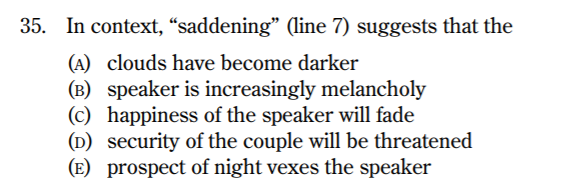
Source: The College Board
2. Understand the theme of the poem or passage
You should be able to summarize and articulate what the excerpt is about and what sort of message it conveys.

3. Paraphrase or reformulate selected lines from the passage
Students are tested on their reading comprehension by being asked to select the reformulated response that most closely aligns with the original excerpt.

4. Explain the function of…
- The narrator or speaker: Know how a narrator’s or speaker’s perspective controls the details and emphases that affect how readers experience and interpret a text.

- Characters : Grasp how characters allow the reader to explore values, beliefs, assumptions, biases, and cultural norms.

- The plot and structure : Understand what the author conveys by the arrangement of the sections of text, their relationship to each other, and sequence, along with how the reader’s interpretation of the text is affected by these choices.

- Symbols and motifs : Describe the purpose of symbols and motifs and how they contribute to the meaning of the passage.

5. Identify parts of speech, verse forms, and meters
You’ll occasionally need more technical knowledge of parts of speech (adjective, adverb, etc.) and verse forms (blank verse, free verse, sonnet, etc.). You should also have a basic knowledge of poetic meter (iambic pentameter, trochaic tetrameter, etc).

Section 2: Free Response
2 hours 15 minutes | 3 questions | 55% of Score
The second section of the AP Literature exam is two hours (plus a 15-minute reading period) and contains three free response questions. These prompts test three core abilities:
- A literary analysis of a poem
- A literary analysis of a piece of prose fiction (this may include drama)
- An analysis that examines a specific concept, issue, or element in a meritorious literary work selected by the student.
The free response essays are graded by college and AP Lit teachers following a standardized rubric.
Below are 3 example free response questions from 2019’s AP Literature Exam:
1. “Carefully read P. K. Page’s 1943 poem “The Landlady.” Then, in a well-organized essay, analyze the speaker’s complex portrayal of the landlady. You may wish to consider such elements as imagery, selection of detail, and tone.”
2. “Carefully read the following excerpt from William Dean Howells’ novel The Rise of Silas Lapham (1885). Then, in a well-constructed essay, analyze how the author portrays the complex experience of two sisters, Penelope and Irene, within their family and society. You may wish to consider such literary elements as style, tone, and selection of detail.”
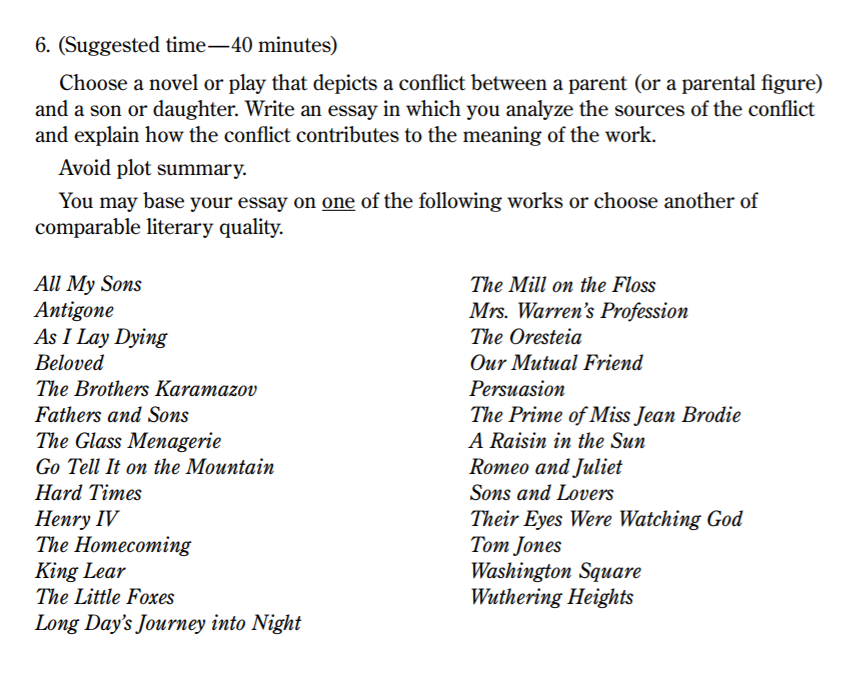
AP Literature Exam Score Distribution, Average Score, and Passing Rate
| AP Literature and Composition | 6.2% | 15.7% | 27.8% | 34.3% | 16.0% |
The AP Literature exam is extremely challenging, with less than half (49.7%) of students achieving a passing score of 3 or higher. The average student score is 2.62—only Physics (2.51) and Human Geography (2.55) have lower average scores. If you’re curious about other score distributions, see our post Easiest and Hardest AP Exams .
Best Ways to Study for the AP Literature Exam
One of the first steps you should take when preparing for the AP Literature exam is to look at its full course description . This will help guide your studying and understanding of the knowledge required for the AP Literature exam. Below are a few more steps you can take to ace the AP Literature exam.
Step 1: Assess Your Skills
Practice Questions and Tests: Take a practice test to assess your initial knowledge. The College Board’s AP English Literature Course and Exam Description offers some sample multiple-choice questions, and the College Board also provides six sample AP Lit free-response questions with scoring commentaries . Older versions of the AP English Literature exam are also available; you can find a copy of the 2012 AP Lit exam and the 1999 AP Lit exam . Search around the web and you’ll likely turn up even more practice exams with answers keys —some will even have explanations of the questions. You’ll also find practice tests in many of the official study guides, and some even include a diagnostic test to act as your initial assessment.
Identify Areas in Need of Improvement: Once you have taken some kind of formative assessment, score it to identify your areas of strength and areas in need of improvement. It can be helpful to have a friend (or even better, a teacher) score your free-response essays, since they are more subjective than the multiple-choice section. With an accurate formative assessment, you’ll have a better idea of where to focus your studying efforts.
Step 2: Know Your Material
In the case of the AP Literature exam, this means focusing on your reading and writing skills.
Become an Active Reader: When reading, take care to go slowly and reread important or complex sections. Pause often to consider meaning, context, and intent. Become an active reader, underlining and taking notes as you go. Remember that the importance of the text comes not only from the author, but also from how the text affects you, the reader. Pay attention to how you feel and why you feel that way. Visit the College Board’s Reading Study Skills for more information.
Write Frequently: Prepare for the writing section of your exam by writing frequently. According to the College Board, the goal is to become a “practiced, logical, clear, and honest” writer through the writing process. This means that you will plan, draft, review, redraft, edit, and polish your writing again and again. To be a successful writer on your exam, you will need to organize your ideas ahead of time, use your text wisely to support a clearly stated thesis, and provide a logical argument. Finally, you should pay close attention to your use of grammar, vocabulary, and sentence structure. Visit the College Board’s Writing Study Skills for more information.
Get Expert Advice: For more specific guidance about test preparation, consider using a formal study guide. One good choice is Barron’s AP English Literature and Composition, 6th Edition . This study guide contains a review of test topics covering details test takers need to know about poetry, fiction, and drama, and includes five full-length practice tests. Some users do criticize it for providing few examples of scored student essays, but plenty of those are available on the College Board scoring examples page .
The Princeton Review’s Cracking the AP English Language & Composition Exam, 2020 Edition: Proven Techniques to Help You Score a 5 is another solid choice containing a summary of test strategies and a focused review of course content.
Alternatively, there are many online study resources available. Some AP teachers have even published their own study guides or review sheets online. You can find one such guide here .
Consider using an app to study: A convenient way to study is to use one of the recently-developed apps for AP exams. These can be free or cost a small fee, and they provide an easy way to quiz yourself on-the-go. Make sure you read reviews before choosing one—their quality varies widely. One that does receive good reviews is the McGraw Hill 5 which also saves you some money by covering 14 different AP subjects.
Step 3: Practice Multiple-Choice Questions
Once you have your theory down, test it out by practicing multiple-choice questions. You can find these in most study guides or through online searches. There are some available in the College Board’s course description.
Try to keep track of which concept areas are still tripping you up, and go back over this theory again. Keep in mind that the key to answering questions correctly is understanding the passage, so practice active reading skills as you’re tackling the multiple-choice questions. This includes underlining, mouthing words, and circling key points. Remember, the answer will always be found in the text, and often the question will tell you exactly where in the text to look for it.
Step 4: Practice Free-Response Essays
Focus on Writing Skills: Use a rich vocabulary, varied sentence structure, and logical progression of ideas. Make sure that your words flow easily from one to the next. According to the College Board’s scoring criteria , writing that suffers from grammatical and/or mechanical errors that interfere with communication cannot earn a the maximum score of a 6, no matter how strong your thesis, compelling your argument, or convincing your evidence is.
Cultivate Cohesive Writing: You should also strive to write a thoughtful and persuasive analysis of the literature. Begin by writing a quick outline to structure your piece. Make sure that your introduction leads to a clearly stated thesis and use supporting paragraphs to build this argument. Use quotes judiciously in your answers and focus on writing with sophistication and clarity.
Practice, Practice, Practice: The best way to prepare for these free-response questions is through repeated exercises analyzing short prose passages and poems, and through practicing with open analytical questions.
Understand Scoring: As you prepare for the writing portion of your exam, be sure to review how your free responses will be scored. Each free-response essay is graded on a scale from 0 to 6 with points awarded for three elements: Thesis (0-1 point), Evidence and Commentary (0-4 points), and Sophistication (0-1 point). A comprehensive explanation of the College Board’s scoring rubric is found on their website.
Study the free-response questions and scored student responses with written explanations provided by the College Board . The most effective way to use these is to read and respond to the prompts first, then review the student samples and scoring explanations. Use this feedback to practice another prompt and repeat the cycle until you are confident that your responses are as strong as the top scorers’.
Step 5: Take Another Practice Test
As you did at the beginning of your studying, take a practice test to see which areas you’ve improved in and which still require practice.
If you have time, repeat each of the steps above to incrementally increase your score.
Step 6: Exam Day Specifics
If you’re taking the AP course associated with this exam, your teacher will walk you through how to register. If you’re self-studying, check out CollegeVine’s How to Self-Register for AP Exams .
For information about what to bring to the exam, see CollegeVine’s What Should I Bring to My AP Exam (And What Should I Definitely Leave at Home)?
CollegeVine can’t predict how you’ll score on your AP Literature exam, but we can help take the guesswork out of college admissions. Our free chancing engine uses a data-driven algorithm taking into consideration criteria such as GPA, standardized test scores, and extracurricular activities to tell you your odds of acceptance at over 500 colleges and universities.
Check out these other Collegevine articles for more information about AP exams.
- 2020 AP Exam Schedule
- How Long is Each AP Exam?
Want access to expert college guidance — for free? When you create your free CollegeVine account, you will find out your real admissions chances, build a best-fit school list, learn how to improve your profile, and get your questions answered by experts and peers—all for free. Sign up for your CollegeVine account today to get a boost on your college journey.
Related CollegeVine Blog Posts

This site uses various technologies, as described in our Privacy Policy, for personalization, measuring website use/performance, and targeted advertising, which may include storing and sharing information about your site visit with third parties. By continuing to use this website you consent to our Privacy Policy and Terms of Use .
Enter your email to unlock an extra $25 off an sat or act program, by submitting my email address. i certify that i am 13 years of age or older, agree to recieve marketing email messages from the princeton review, and agree to terms of use., guide to the ap english literature and composition exam.

Do you know how to conduct a close reading of prose and poetry? Can you write effectively under time constraints? The AP ® English Literature and Composition exam tests topics and skills discussed in your AP English Literature course. If you score high enough, your AP English score could earn you college credit!
Check out our AP English Literature Guide for what you need to know about the exam:
- Exam Overview
- Structure & Question Types
- How to Prepare
What’s on the AP English Literature & Composition Exam?
The College Board lists 6 Skill Categories that should be covered in your AP English Literature and Composition course, or as you prepare for the test:
- Character—Characters in literature show a wide range of values, beliefs, assumptions, biases, and cultural norms, and provide an opportunity to study and explore what the characters represent.
- Setting—A setting and the details associated with it represent a time and place, but also convey values associated with the setting.
- Structure—Structure refers to the arrangements of sections and parts of a text, the relationship of the parts to each other, and the sequence in which the text reveals information. These are all choices made by a writer that allow you to interpret a text.
- Narration—Any narrator’s or speaker’s perspective controls the details and emphases that readers encounter; therefore, narration affects how readers experience and interpret a text.
- Figurative language—Comparisons, representations, and associations shift meaning from the literal to the figurative. Figurative language can include word choice, imagery, and symbols. Simile, metaphor, personification, and allusions are all examples of figurative language.
- Literary argumentation—How do you write about literature yourself? You develop your interpretation (using the first five of the Big Six!) and then communicate it. You need to develop a thesis—a defensible claim—and support it with textual evidence.
The multiple-choice section of the AP English Literature and Composition exam will be testing your knowledge of the Big Six. Each one is weighted a certain amount in the multiple-choice questions.
AP English Literature & Composition Book List
There is no required reading or book list for the AP English Literature exam, but the College Board provides a list of authors and poets with whom you should be familiar and whose work is of the caliber and density that you are expected to understand. These lists include:
- Poetry: W.H. Auden, Elizabeth Bishop, William Blake, Anne Bradstreet, Edward Kamau Brathwaite, Gwendolyn Brooks, Robert Browning, George Gordon/Lord Byron, Lorna Dee Cervantes, Geoffrey Chaucer, Lucille Clifton, Samuel Taylor Coleridge, Billy Collins, H.D. (Hilda Doolittle), Emily Dickinson, John Donne, Rita Dove, Paul Laurence Dunbar, T.S. Eliot, Robert Frost, Joy Harjo, Seamus Heaney, George Herbert, Garrett Hongo, Gerard Manley Hopkins, Langston Hughes, Ben Jonson, John Keats, Philip Larkin, Robert Lowell, Andrew Marvell, John Milton, Marianne Moore, Sylvia Plath, Edgar Allan Poe, Alexander Pope, Adrienne Rich, Anne Sexton, William Shakespeare, Percy Bysshe Shelley, Leslie Marmon Silko, Cathy Song, Wallace Stevens, Alfred, Lord Tennyson, Derek Walcott, Walt Whitman, Richard Wilbur, William Carlos Williams, William Wordsworth, William Butler Yeats
- Drama: Aeschylus, Edward Albee, Amiri Baraka, Samuel Beckett, Anton Chekhov, Caryl Churchill, William Congreve, Athol Fugard, Lorraine Hansberry, Lillian Hellman, David Henry Hwang, Henrik Ibsen, Ben Jonson, David Mamet, Arthur Miller, Molière, Marsha Norman, Sean O’Casey, Eugene O’Neill, Suzan-Lori Parks, Harold Pinter, Luigi Pirandello, William Shakespeare, George Bernard Shaw, Sam Shepard, Sophocles, Tom Stoppard, Luis Valdez, Oscar Wilde, Tennessee Williams, August Wilson
- Fiction (Novel and Short Story): Chinua Achebe, Sherman Alexie, Isabel Allende, Rudolfo Anaya, Margaret Atwood, Jane Austen, James Baldwin, Saul Bellow, Charlotte Bronte, Emily Bronte, Raymond Carver, Willa Cather, John Cheever, Kate Chopin, Sandra Cisneros, Joseph Conrad, Edwidge Danticat, Daniel Defoe, Anita Desai, Charles Dickens, Fyodor Dostoevsky, George Eliot, Ralph Ellison, Louise Erdrich, William Faulkner, Henry Fielding, F. Scott Fitzgerald, E.M. Forster, Thomas Hardy, Nathaniel Hawthorne, Ernest Hemingway, Zora Neale Hurston, Kazuo Ishiguro, Henry James, Ha Jin, Edward P. Jones, James Joyce, Maxine Hong Kingston, Joy Kogawa, Jhumpa Lahiri, Margaret Laurence, D.H. Lawrence, Chang-rae Lee, Bernard Malamud, Gabriel García Márquez, Cormac McCarthy, Ian McEwan, Herman Melville, Toni Morrison, Bharati Mukherjee, Vladimir Nabokov, Flannery O’Connor, Orhan Pamuk, Katherine Anne Porter, Marilynne Robinson, Jonathan Swift, Mark Twain, John Updike, Alice Walker, Evelyn Waugh, Eudora Welty, Edith Wharton, John Edgar Wideman, Virginia Woolf, Richard Wright
- Expository Prose: Joseph Addison, Gloria Anzaldua, Matthew Arnold, James Baldwin, James Boswell, Joan Didion, Frederick Douglass, W.E.B. Du Bois, Ralph Waldo Emerson, William Hazlitt, bell hooks, Samuel Johnson, Charles Lamb, Thomas Macaulay, Mary McCarthy, John Stuart Mill, George Orwell, Michael Pollan, Richard Rodriguez, Edward Said, Lewis Thomas, Henry David Thoreau, E.B. White, Virginia Woolf
Read More: Review for the exam with our AP English Literature Cram Courses
AP English Literature Structure & Question Types
The AP English Literature & Composition exam takes 3 hours to complete and consists of two sections: a multiple-choice section and a free response section.
|
|
|
| |
| Section 1 | 60 minutes | 55 multiple-choice questions | 45% |
| Section 2 | 120 minutes | 3 free response questions | 55% |
Multiple-Choice
AP English Literature multiple-choice questions are grouped in sets. You will be given 5 passages or poems to read, with 8-13 multiple-choice questions to assess your reading comprehension. Each multiple-choice question has 5 answer choices (A through E). That’s a lot of reading then recalling, understanding, and interpreting. Use your time effectively and wisely!
Free Response
- Respond to the prompt with a thesis that presents an interpretation and may establish a line of reasoning.
- Select and use evidence to develop and support your line of reasoning.
- Explain the relationship between the evidence and your thesis.
- Use appropriate grammar and punctuation in communicating your argument.
How to Interpret AP English Literature Scores
AP scores are reported from 1 to 5. Colleges are generally looking for a 4 or 5 on the AP English Literature exam, but some may grant credit for a 3. (Here's a quick overview of AP credit policy .) Each test is curved so scores vary from year to year. Here’s how AP English Lit students scored on the May 2022 test:
|
|
|
|
| 5 | Extremely qualified | 16.9% |
| 4 | Well qualified | 27.3% |
| 3 | Qualified | 33.7% |
| 2 | Possibly qualified | 14.1% |
| 1 | No recommendation | 7.9% |
Source: College Board
How can I prepare?
AP classes are great, but for many students they’re not enough! For a thorough review of AP English Literature content and strategy, pick the AP prep option that works best for your goals and learning style.
- AP Exams

Explore Colleges For You
Connect with our featured colleges to find schools that both match your interests and are looking for students like you.

Career Quiz
Take our short quiz to learn which is the right career for you.

Get Started on Athletic Scholarships & Recruiting!
Join athletes who were discovered, recruited & often received scholarships after connecting with NCSA's 42,000 strong network of coaches.

Best 390 Colleges
168,000 students rate everything from their professors to their campus social scene.
SAT Prep Courses
1400+ course, act prep courses, free sat practice test & events, 1-800-2review, free digital sat prep try our self-paced plus program - for free, get a 14 day trial.
Enrollment Advisor
1-800-2REVIEW (800-273-8439) ext. 1
1-877-LEARN-30
Mon-Fri 9AM-10PM ET
Sat-Sun 9AM-8PM ET
Student Support
1-800-2REVIEW (800-273-8439) ext. 2
Mon-Fri 9AM-9PM ET
Sat-Sun 8:30AM-5PM ET
Partnerships
- Teach or Tutor for Us
College Readiness
International
Advertising
Affiliate/Other
- Enrollment Terms & Conditions
- Accessibility
- Cigna Medical Transparency in Coverage
Register Book
Local Offices: Mon-Fri 9AM-6PM
- SAT Subject Tests
Academic Subjects
- Social Studies
Find the Right College
- College Rankings
- College Advice
- Applying to College
- Financial Aid
School & District Partnerships
- Professional Development
- Advice Articles
- Private Tutoring
- Mobile Apps
- International Offices
- Work for Us
- Affiliate Program
- Partner with Us
- Advertise with Us
- International Partnerships
- Our Guarantees
- Accessibility – Canada
Privacy Policy | CA Privacy Notice | Do Not Sell or Share My Personal Information | Your Opt-Out Rights | Terms of Use | Site Map
©2024 TPR Education IP Holdings, LLC. All Rights Reserved. The Princeton Review is not affiliated with Princeton University
TPR Education, LLC (doing business as “The Princeton Review”) is controlled by Primavera Holdings Limited, a firm owned by Chinese nationals with a principal place of business in Hong Kong, China.
AP English Literature and Composition
Learn all about the course and exam. Already enrolled? Join your class in My AP.
Not a Student?
Go to AP Central for resources for teachers, administrators, and coordinators.
About the Course
What makes a work of literature great? In AP English Literature and Composition, you’ll examine how authors and poets create meaning through their rich, purposeful use of language. As you write and refine essays about literature, you’ll develop the skills of analysis and composition that will allow you to communicate your interpretation effectively.
New for 2024-25: MCQs Will Have Four Answer Choices
Starting in the 2024-25 school year, AP English Literature and Composition multiple-choice questions (MCQs) will have four answer choices instead of five. This change will take effect with the 2025 exam. All resources have been updated to reflect this change.
Skills You'll Learn
Read a text closely and draw conclusions from details
Identify the techniques used by an author and their effects
Develop an interpretation of a text
Present your interpretation and make an argument for it in writing
Equivalency and Prerequisites
College course equivalent.
An introductory college-level literature course
Recommended Prerequisites
Wed, May 7, 2025
AP English Literature and Composition Exam
This is the regularly scheduled date for the AP English Literature and Composition Exam.
About the Units
The course content outlined below is organized into commonly taught units of study that provide one possible sequence for the course. Your teacher may choose to organize the course content differently based on local priorities and preferences.
Course Content
Unit 1: short fiction i.
You’ll learn critical reading skills to help you critically read, interpret, and analyze prose.
Topics may include:
- Interpreting the role of character in fiction
- Identifying and interpreting setting
- Understanding how a story’s structure affects interpretations
- Understanding and interpreting a narrator’s perspective
- Reading texts literally and figuratively
- The basics of literary analysis
Unit 2: Poetry I
You’ll continue your critical reading exploration in poetry and learn to analyze similar elements within a wide variety of poems.
- Identifying characters in poetry
- Understanding and interpreting meaning in poetic structure
- Analyzing word choice to find meaning
- Identifying techniques like contrast, simile, metaphor, and alliteration
Unit 3: Longer Fiction or Drama I
You’ll observe how the literary techniques you’ve explored in prior units unfold over the course of longer works and analyze how characters develop and interact over the course of a narrative.
- Interpreting character description and perspective
- Character evolution throughout a narrative
- Conflict and plot development
- Interpreting symbolism
- Identifying evidence and supporting literary arguments
Unit 4: Short Fiction II
You’ll delve deeper into the roles of character and conflict in fiction and explore how a narrator’s perspective can color storytelling.
- Protagonists, antagonists, character relationships, and conflict
- Character interactions with setting and its significance
- Archetypes in literature
- Types of narration like stream of consciousness
- Narrative distance, tone, and perspective
Unit 5: Poetry II
You’ll study different forms of poetry and examine how structure and figurative language can create and impact meaning.
- Traits of closed and open structures in poetry
- Use of techniques like imagery and hyperbole
- Types of comparisons in poetry including personification and allusion
- Identifying and interpreting extended metaphors
Unit 6: Longer Fiction or Drama II
You’ll analyze how various literary techniques play out and shift over the course of longer works, charting how characters change (or don’t) as they’re affected by developments in the plot.
- Interpreting foil characters
- Understanding and interpreting character motives
- Understanding nonlinear narrative structures like flashbacks and foreshadowing
- The effect of narrative tone and bias on reading
- Characters as symbols, metaphors, and archetypes
- Developing literary arguments within a broader context of works
Unit 7: Short Fiction III
You’ll examine how works of fiction interact with and comment on the world around them and the society their authors live or lived in.
- Sudden and more gradual change in characters
- Epiphany as a driver of plot
- Relationships between characters and groups
- Character interactions with settings
- The significance of the pacing of a narrative
- Setting as a symbol
- Interpreting texts in their historical and societal contexts
Unit 8: Poetry III
You’ll develop your interpretation of poetry further by examining how contrasts, ambiguous language, and various other techniques can add layers of meaning to a poetic work.
- Looking at punctuation and structural patterns
- Interpreting juxtaposition, paradox, and irony
- How ambiguity can allow for various interpretations
- Identifying symbols, conceits, and allusions
- Learning proper attribution and citation in literary analysis
Unit 9: Longer Fiction or Drama III
You’ll consider longer narratives in the context of the various techniques and interpretations you’ve learned in prior units and build a nuanced analysis of each complex work as a whole.
- Looking at a character’s response to the resolution of a narrative
- Suspense, resolution, and plot development
- Narrative inconsistencies and contrasting perspectives
Credit and Placement
Search AP Credit Policies
Find colleges that grant credit and/or placement for AP Exam scores in this and other AP courses.
Course Resources
Ap classroom resources.
Once you join your AP class section online, you’ll be able to access AP Daily videos, any assignments from your teacher, and your assignment results in AP Classroom. Sign in to access them.
- Go to AP Classroom
AP English Literature and Composition Reading Study Skills
Advice to keep up with the reading workload in your AP class.
AP English Literature and Composition Writing Study Skills
Learn to craft your writing process.
AP English Literature and Composition Course and Exam Description
This is the core document for the course. It clearly lays out the course content and describes the exam and AP Program in general.
The Difference Between AP English Language and Composition and AP English Literature and Composition
Learn the similarities and differences between these two courses and exams.
- Go to College Board Blog
See Where AP Can Take You
AP English Literature and Composition can lead to a wide range of careers and college majors
Additional Information

IMAGES
VIDEO
COMMENTS
Students write essays that respond to 3 free-response prompts from the following categories: A literary analysis of a given poem A literary analysis of a given passage of prose fiction (this may include drama)
AP Literature Exam: Key Takeaways. The AP Literature exam is a three-hour test that includes an hour-long multiple-choice section based on five prose and poetry passages and with 55 questions, and a two-hour free-response section with three essays: one analyzing a poetry passage, one analyzing a prose passage, and one analyzing a work chosen by ...
Download free-response questions from past AP English Literature and Culture exams, along with scoring guidelines, sample responses, and scoring distributions.
AP Lit Prose Essay Examples - we analyze the strengths and weaknesses of AP Lit prose essay examples to help you prepare for the exam.
The AP English Literature and Composition framework included in the course and exam description outlines distinct skills that students should practice throughout the year—skills that will help them learn to read texts critically.
The AP Literature and Composition Exam consists of three essays that you'll need to write within a 2-hour time frame. Here's a breakdown of the three types of essays: 1. Poetry Analysis Essay: In this essay, you will be provided with a poem and given a prompt that asks you to analyze specific elements of the poem.
The AP English Literature and Composition Exam will test your understanding of the literary concepts covered in the course units, as well as your ability to analyze texts and develop written arguments based on your interpretations. This is a fully digital exam.
The free response essays are graded by college and AP Lit teachers following a standardized rubric. Below are 3 example free response questions from 2019’s AP Literature Exam: 1.
Make your study plan for the AP English Literature exam! These are the topics and question types you need to know for your AP English Lit review.
In AP English Literature and Composition, you’ll examine how authors and poets create meaning through their rich, purposeful use of language. As you write and refine essays about literature, you’ll develop the skills of analysis and composition that will allow you to communicate your interpretation effectively.